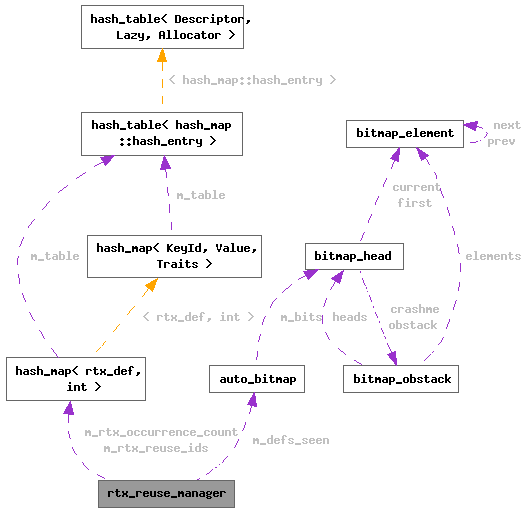rtx_reuse_manager Class Reference
#include <print-rtl.h>
Collaboration diagram for rtx_reuse_manager:

Public Member Functions | |
| rtx_reuse_manager () | |
| void | preprocess (const_rtx x) |
| bool | has_reuse_id (const_rtx x, int *out) |
| bool | seen_def_p (int reuse_id) |
| void | set_seen_def (int reuse_id) |
Private Attributes | |
| hash_map< const_rtx, int > | m_rtx_occurrence_count |
| hash_map< const_rtx, int > | m_rtx_reuse_ids |
| auto_bitmap | m_defs_seen |
| int | m_next_id |
Detailed Description
For some rtx codes (such as SCRATCH), instances are defined to only be
equal for pointer equality: two distinct SCRATCH instances are non-equal.
copy_rtx preserves this equality by reusing the SCRATCH instance.
For example, in this x86 instruction:
(cinsn (set (mem/v:BLK (scratch:DI) [0 A8])
(unspec:BLK [
(mem/v:BLK (scratch:DI) [0 A8])
] UNSPEC_MEMORY_BLOCKAGE)) "test.c":2
(nil))
the two instances of "(scratch:DI)" are actually the same underlying
rtx pointer (and thus "equal"), and the insn will only be recognized
(as "*memory_blockage") if this pointer-equality is preserved.
To be able to preserve this pointer-equality when round-tripping
through dumping/loading the rtl, we need some syntax. The first
time a reused rtx is encountered in the dump, we prefix it with
a reuse ID:
(0|scratch:DI)
Subsequent references to the rtx in the dump can be expressed using
"reuse_rtx" e.g.:
(reuse_rtx 0)
This class is responsible for tracking a set of reuse IDs during a dump.
Dumping with reuse-support is done in two passes:
(a) a first pass in which "preprocess" is called on each top-level rtx
to be seen in the dump. This traverses the rtx and its descendents,
identifying rtx that will be seen more than once in the actual dump,
and assigning them reuse IDs.
(b) the actual dump, via print_rtx etc. print_rtx detect the presence
of a live rtx_reuse_manager and uses it if there is one. Any rtx
that were assigned reuse IDs will be printed with it the first time
that they are seen, and then printed as "(reuse_rtx ID)" subsequently.
The first phase is needed since otherwise there would be no way to tell
if an rtx will be reused when first encountering it. Constructor & Destructor Documentation
◆ rtx_reuse_manager()
| rtx_reuse_manager::rtx_reuse_manager | ( | ) |
rtx_reuse_manager's ctor.
References m_next_id.
Member Function Documentation
◆ has_reuse_id()
Return true iff X has been assigned a reuse ID. If it has, and OUT is non-NULL, then write the reuse ID to *OUT.
References m_rtx_reuse_ids.
◆ preprocess()
| void rtx_reuse_manager::preprocess | ( | const_rtx | x | ) |
Traverse X and its descendents, determining if we see any rtx more than once. Any rtx suitable for "reuse_rtx" that is seen more than once is assigned an ID.
References count, FOR_EACH_SUBRTX, m_next_id, m_rtx_occurrence_count, m_rtx_reuse_ids, and uses_rtx_reuse_p().
◆ seen_def_p()
| bool rtx_reuse_manager::seen_def_p | ( | int | reuse_id | ) |
Determine if set_seen_def has been called for the given reuse ID.
References bitmap_bit_p, and m_defs_seen.
◆ set_seen_def()
| void rtx_reuse_manager::set_seen_def | ( | int | reuse_id | ) |
Record that the definition of the given reuse ID has been seen.
References bitmap_set_bit, and m_defs_seen.
Field Documentation
◆ m_defs_seen
|
private |
Referenced by seen_def_p(), and set_seen_def().
◆ m_next_id
|
private |
Referenced by preprocess(), and rtx_reuse_manager().
◆ m_rtx_occurrence_count
Referenced by preprocess().
◆ m_rtx_reuse_ids
Referenced by has_reuse_id(), and preprocess().
The documentation for this class was generated from the following files: